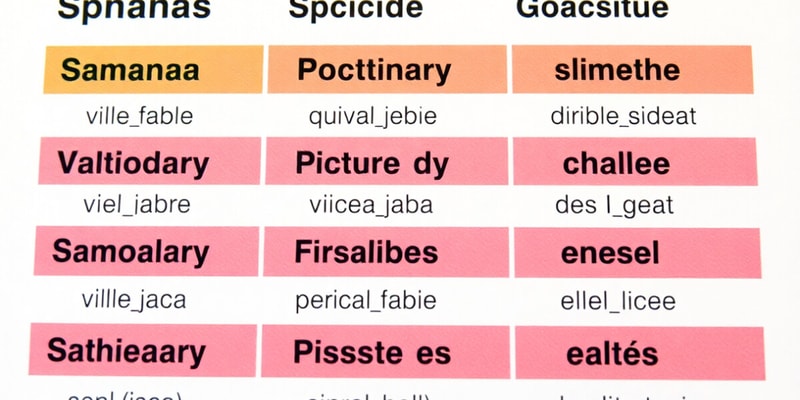Podcast
Questions and Answers
"Ser" means...
"Ser" means...
"Is" easily translates to:
"Is" easily translates to:
"Are" easily usually translates to:
"Are" easily usually translates to:
How do you spell zero in Spanish?
How do you spell zero in Spanish?
Signup and view all the answers
What is Wednesday in Spanish?
What is Wednesday in Spanish?
Signup and view all the answers
Hoy es viernes. Mañana es...
Hoy es viernes. Mañana es...
Signup and view all the answers
Mañana es jueves. Hoy es...
Mañana es jueves. Hoy es...
Signup and view all the answers
La señora Strom y yo ____ maestras.
La señora Strom y yo ____ maestras.
Signup and view all the answers
What does "Ser" mean?
What does "Ser" mean?
Signup and view all the answers
How do you translate "Is" into Spanish?
How do you translate "Is" into Spanish?
Signup and view all the answers
If today is Friday, what is tomorrow?
If today is Friday, what is tomorrow?
Signup and view all the answers
What does the word "Soy" mean in the sentence "I am a pretty girl and an organized student." ?
What does the word "Soy" mean in the sentence "I am a pretty girl and an organized student." ?
Signup and view all the answers
What does the word "Son" mean in the sentence "Y'all (not Spain) are some hard-working women."?
What does the word "Son" mean in the sentence "Y'all (not Spain) are some hard-working women."?
Signup and view all the answers
Match the English pronouns with their Spanish equivalents.
Match the English pronouns with their Spanish equivalents.
Signup and view all the answers
What does the verb "Gustar" mean?
What does the verb "Gustar" mean?
Signup and view all the answers
What goes before "You like" to emphasize who likes it?
What goes before "You like" to emphasize who likes it?
Signup and view all the answers
When you have two or more names what follows? A Trace y a Gauge _____ gusta comer Chick-l-A.
When you have two or more names what follows? A Trace y a Gauge _____ gusta comer Chick-l-A.
Signup and view all the answers
When you have a name + I, what follows? A Melanie y a mí _____ gusta comer Chick-l-A.
When you have a name + I, what follows? A Melanie y a mí _____ gusta comer Chick-l-A.
Signup and view all the answers
When you have a name + you (y'all), what follows? A Taryn y a ti _____ gusta comer Chick-l-A.
When you have a name + you (y'all), what follows? A Taryn y a ti _____ gusta comer Chick-l-A.
Signup and view all the answers
What does the bold word "Renata" mean in the sentence, "Renata likes to draw the girls and the boys"?
What does the bold word "Renata" mean in the sentence, "Renata likes to draw the girls and the boys"?
Signup and view all the answers
What does "Les gustan" mean in the sentence, "They like the frappuccinos at Starbucks"?
What does "Les gustan" mean in the sentence, "They like the frappuccinos at Starbucks"?
Signup and view all the answers
What do definite articles mean?
What do definite articles mean?
Signup and view all the answers
What is the Spanish word for "the"?
What is the Spanish word for "the"?
Signup and view all the answers
What do "A/An" and "Some" in English translate to in Spanish?
What do "A/An" and "Some" in English translate to in Spanish?
Signup and view all the answers
To form the plural of a noun ending in a vowel, you add ______.
To form the plural of a noun ending in a vowel, you add ______.
Signup and view all the answers
To form the plural of a noun ending in a consonant, you add ______.
To form the plural of a noun ending in a consonant, you add ______.
Signup and view all the answers
What is the correct conjugation of the verb "gustar" in the sentence, " Me gusta aprender ______"?
What is the correct conjugation of the verb "gustar" in the sentence, " Me gusta aprender ______"?
Signup and view all the answers
What is the correct word to fill in the blank in the sentence "A mí no me gusta trabajar. Soy muy ______."
What is the correct word to fill in the blank in the sentence "A mí no me gusta trabajar. Soy muy ______."
Signup and view all the answers
Match the English word with its Spanish equivalent.
Match the English word with its Spanish equivalent.
Signup and view all the answers
Study Notes
Spanish Verb Conjugations
- Yo: Used for the first person singular
- Tú: Used for the second person singular
- Él/Ella/Usted: Used for the third person singular (formal)
- Nosotr@s: Used for the first person plural
- Vosotr@s: Used for the second person plural (archaic or in some dialects)
- Ell@s/Ustedes: Used for the third person plural (formal)
Spanish Meanings
- Ser: Means "to be" in Spanish
- Gustar: Means "to like" in Spanish
- Tener: Means "to have" in Spanish
Spanish Days of the Week
- Jueves: Thursday
- Lunes: Monday
- Viernes: Friday
- Miércoles: Wednesday
- Martes: Tuesday
- Sábado: Saturday
- Domingo: Sunday
Spanish Numbers
- Cero: Zero
- Diez: Ten
Spanish Articles
- Indefinite articles: a, an, some
- Definite articles: the (el, la, los, las)
Spanish Greetings
- Buenos días: Good morning
- Buenas tardes: Good afternoon
- Buenas noches: Good evening/Good night
Other Notes
- Vosotros/Vosotras: Second person plural pronoun, mostly used in Spain.
Studying That Suits You
Use AI to generate personalized quizzes and flashcards to suit your learning preferences.
Related Documents
Description
Test your knowledge on basic Spanish vocabulary including verb conjugations, days of the week, numbers, articles, and greetings. This quiz is ideal for beginners looking to strengthen their understanding of fundamental Spanish concepts.




